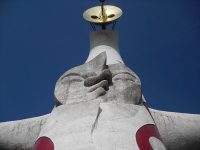Misfortunes never come…
![IMAGE: Misfortunes never come singly. [Misfortunes seldom come singly.] / One misfortune rides upon another's back. / It never rains but it pours.](https://www.ok312.net/wp-content/uploads/2015/03/bike-239882_640-200x133.jpg)
Misfortunes never come singly. [Misfortunes seldom come singly.] / One misfortune rides upon another’s back. / It never rains but it pours. More »
![IMAGE: Misfortunes never come singly. [Misfortunes seldom come singly.] / One misfortune rides upon another's back. / It never rains but it pours.](https://www.ok312.net/wp-content/uploads/2015/03/bike-239882_640-200x133.jpg)
Misfortunes never come singly. [Misfortunes seldom come singly.] / One misfortune rides upon another’s back. / It never rains but it pours. More »
![IMAGE: Misfortunes never come singly. [Misfortunes seldom come singly.] / One misfortune rides upon another's back. / It never rains but it pours.](https://www.ok312.net/wp-content/uploads/2015/03/bike-239882_640-200x133.jpg)
泣きっ面に蜂。 – 『いろは歌留多(江戸)』(日本の諺) / 弱り目に祟り目。(日本の諺) / 不幸は一つだけではこない。 / 災難は続くもの。 / 降るときは必ずどしゃ降り。 More »

Today’s art should not be good. It should not be beautiful. It should not be pleasant. – Taro Okamoto [Okamoto Tarō] (1911 – 1996): Today’s Art [The Art of Today] (Image by kojikamei from Pixabay) (Text-to-Speech by Sound of Text,… More »

今日の芸術は、うまくあってはいけない。きれいであってはならない。ここちよくあってはならない。 – 岡本太郎 (1911 – 1996): 『今日の芸術』 (kojikameiによるPixabayからの画像) (Google Translateのエンジンを使用した、Sound of Textによるテキスト読み上げ) More »

The hand that rocks the cradle rules the world. More »

ゆりかごをゆする手は世界を支配する。 / (次の世代を育てるものは母。) More »

A man’s mind often gives him warning of evil to come. More »

虫の知らせ。[虫が知らせる。](日本の諺・慣用句) / 心は、迫り来る災いをしばしば本人に警告する。 More »

The really great writers are people like Emily Brontë who sit in a room and write out of their limited experience and unlimited imagination. – James A. [Albert] Michener (1907 – 97) More »

本当に偉大な作家とは、エミリー・ブロンテのように、部屋の中に座りながら限られた経験と限りない想像力で作品を書き上げてしまう人たちのことだ。 – ジェームズ・A・ミッチェナー (1907 – 97) More »